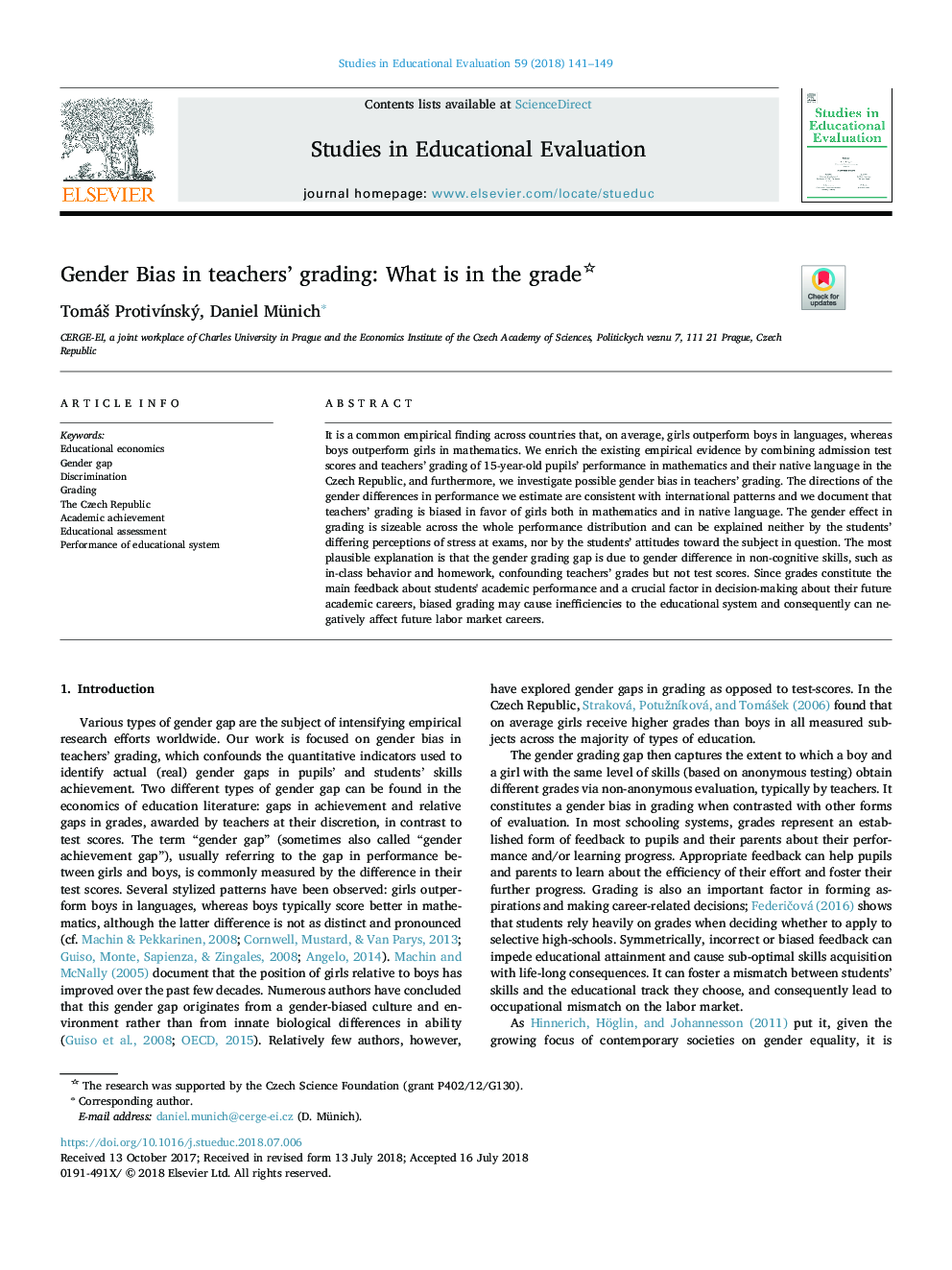| کد مقاله | کد نشریه | سال انتشار | مقاله انگلیسی | نسخه تمام متن |
|---|---|---|---|---|
| 6848918 | 1436674 | 2018 | 9 صفحه PDF | دانلود رایگان |
عنوان انگلیسی مقاله ISI
Gender Bias in teachers' grading: What is in the grade
ترجمه فارسی عنوان
اختلال جنسیتی در درجه بندی معلمان: آنچه در درجه است
دانلود مقاله + سفارش ترجمه
دانلود مقاله ISI انگلیسی
رایگان برای ایرانیان
کلمات کلیدی
اقتصاد آموزشی، شکاف جنسیتی، تبعیض درجه بندی، جمهوری چک، دستاوردهای علمی، ارزیابی آموزشی، عملکرد سیستم آموزشی،
ترجمه چکیده
این یافته تجربی رایج در کشورهای مختلف است که به طور متوسط دختران از زبان پسران بهتر عمل می کنند، در حالی که پسران از دختران در ریاضیات برترند. ما غرامت شواهد تجربی موجود را با ترکیب نمرات آزمون پذیرش و درجه بندی معلمان از دانش آموزان 15 ساله در ریاضیات و زبان مادری خود در جمهوری چک غنی می شوند، و علاوه بر این، ما بررسی احتمال تعصب جنسیتی در درجه بندی معلمان. جهت گیری تفاوت های جنسیتی در عملکرد ما برآورده می شود با الگوهای بین المللی سازگار است و ما مدرک می دهیم که درجه بندی معلمان به نفع دختران در ریاضیات و زبان مادری است. اثر جنسیتی در درجه بندی در کل توزیع عملکرد بسیار قابل توجه است و می توان آن را نه توسط ادراک های متفاوت دانشجویان از استرس در آزمون ها و نه از دیدگاه دانشجویان نسبت به موضوع مورد بحث توضیح داد. توضیح قابل قبول ترین این است که شکاف درجه بندی جنسیتی به علت تفاوت جنسیتی در مهارت های غیر شناختی مانند رفتار در کلاس و تکالیف، اختلاف نمرات معلمان، اما نمرات آزمون نیست. از آنجایی که نمرات بازخورد اصلی در مورد عملکرد تحصیلی دانش آموزان و عامل مهم در تصمیم گیری در مورد حرفه های آکادمیک در آینده خود هستند، درجهبندی متعادل می تواند ناکارایی را در سیستم آموزشی ایجاد کند و در نتیجه می تواند منفی کارهای آینده در بازار کار را تحت تاثیر قرار دهد.
موضوعات مرتبط
علوم انسانی و اجتماعی
علوم اجتماعی
آموزش
چکیده انگلیسی
It is a common empirical finding across countries that, on average, girls outperform boys in languages, whereas boys outperform girls in mathematics. We enrich the existing empirical evidence by combining admission test scores and teachers' grading of 15-year-old pupils' performance in mathematics and their native language in the Czech Republic, and furthermore, we investigate possible gender bias in teachers' grading. The directions of the gender differences in performance we estimate are consistent with international patterns and we document that teachers' grading is biased in favor of girls both in mathematics and in native language. The gender effect in grading is sizeable across the whole performance distribution and can be explained neither by the students' differing perceptions of stress at exams, nor by the students' attitudes toward the subject in question. The most plausible explanation is that the gender grading gap is due to gender difference in non-cognitive skills, such as in-class behavior and homework, confounding teachers' grades but not test scores. Since grades constitute the main feedback about students' academic performance and a crucial factor in decision-making about their future academic careers, biased grading may cause inefficiencies to the educational system and consequently can negatively affect future labor market careers.
ناشر
Database: Elsevier - ScienceDirect (ساینس دایرکت)
Journal: Studies in Educational Evaluation - Volume 59, December 2018, Pages 141-149
Journal: Studies in Educational Evaluation - Volume 59, December 2018, Pages 141-149
نویسندگان
TomáÅ¡ ProtivÃnský, Daniel Münich,
